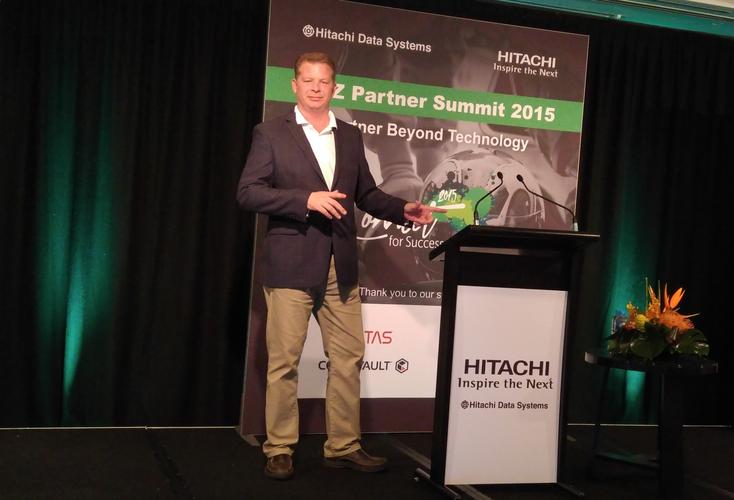
Hitachi Data Systems technology evangelist, Greg Knieriemen
Greg Knieriemen is the first to admit he has a gaudy title. He is Hitachi Data Systems' technology evangelist and strategist and co-host of Speaking in Tech, one of the most popular technology podcasts in the world. Prior to this, he worked for a HDS channel partner for 13 years. He sat down with ARN to talk Cloud, the Internet of Things (that matter), working with Google and where he sees channel partners can add value to the company’s new social innovation play.
Hitachi Data Systems (HDS) has shifted focus from offering traditional infrastructure to leveraging other technologies that come from the firm’s parent, Hitachi.
“We are our own experiment in a lot of ways," he said.
“HDS has obviously traditionally been known for our infrastructure solutions, but if you look at the acquisitions we have made in the last 18 months, whether it’s oXya for an SAP Cloud play, If you look at the Pentaho acquisition that represents our very deep dive into open source, and then if you look at Pantascene which is our public safety play. They are reflective of the direction we are going. We call it social innovation in the Internet of Things that matter.
“Pantascene actually got a bit of press recently in the US, unfortunately in relation to the mass shootings that have occurred there. Police departments and public safety officials now have to get more intelligent about they are managing all the different data points that they have available, whether it’s social media, cameras or developing heat maps for visualisation to better detect and predict crime patterns.
Knieriemen said that, initially, many in the community were initially concerned about the impact of such capability, one news outlet likening it to the film Minority Report. He stressed that it was how these technologies can be used in a positive, or negative, way that has the real impact.
“It’s not just us, every technology vendor has to draw their own conclusions," he said.
“I think we have a role here to be transparent with the public. That is really important for us to distinguish ourselves from these kind of quiet technologies that pop up after Edward Snowden and others like him release information about it.
“There is a lot of hype and buzz around the Internet of Things, people hear that and think, ‘so my toaster is going to be connected to the internet?’ We are trying to distinguish that stuff from the things that matter, it’s really important. Pantascene is a great example of how a public good can be clearly served by leveraging this technology. It’s also a bridge back to our foundational technologies.
“The other element to this is that Hitachi, when it comes to Big Data and social innovation, significantly more patents than Microsoft, IBM and others.
“Clearly, despite the acquisitions we have made in the last 18 months, we are on a different path. We have a vision of what that will look like and how our company will evolve during this transition. It’s not just us, our customers are going through it, partners here are going through this transition and the vendors are also going through the transition.”
Partner opportunities in the social innovation economy
For HDS, the future is very much about the IoT movement and how leveraging analytics platforms like Pentaho will enable partners to crunch that data so that they can base new revenue streams on offering that as-a-service.
Knieriemen said technologies like this presented an opportunity that could be leveraged by HDS partners, but that it would not happen overnight.
“I think it is going to be baby steps and i think we are going to see partners making that transition,” he said.
“It sounds very superficial, but if they are not changing and disrupting themselves and finding new ways of providing value to their customers that they have had for the last ten years, someone else will.
“They need to evolve their own business to better reflect what their customers are going through.”
According to Knieriemen, the big thing HDS needs to provide partners with is the tools that power them through the transition to the 'as-a-service' model that vendors and end users are going through.
“I think partners can easily get caught in the gap there if they are not ramping up and transitioning their business to take advantage of that,” he said.
“You hear us talking about social innovation and the Internet of Things that matter, and I think that the first reaction you might get from some partners will be, ‘I sell a server or converged infrastructure, what’s the Internet of things and how does social innovation make a difference?"
Kubernetes and the container revolution
Read more: Software AG sets out to increase channel activity
Knieriemen is also proud of the work the company had done with Google on developing the the Internet giant’s container platform, Kubernetes.
“Our engineering teams in Washington [state] were working with some of the folks over at Google before Kubernetes was released publicly,” he said.
“Up until that point, our unified compute platform was available to host applications either bare metal or virtual machine and their [HDS developers] eyes got wide when they began to realise what Google was up to by releasing the orchestration for containers in the form of Kubernetes.
“They connected the dots that this is of real value to the unified compute platform. So they got busy, did some testing, actually two very large recognised brands were using it even before the launch.
“They presented at OScon earlier this year, it was funny. I was sitting in the front row for the presentation and as soon as the other developers in the room saw the Hitachi on the powerpoint they began to say, ‘Hitachi? Are you kidding me?’ Because people lump us in with the traditional vendors like Dell, IBM and EMC, but none of them were part of the announcement and so it was a feather in our cap.
“I have to give kudos to our engineering team in working with Google and getting ahead of the curve on that.”
The collaboration came out of the existing relationships that HDS engineers had with their counterparts at Google was key.
“You have to realise that the challenge for Google is that they have the Google compute engine that they are advocating, but to get into the enterprise, they need to be on the platforms that enterprises are using for application development today,” he said.
“What Google was looking at us for was to develop a reference architecture and have it in use with customers to validate how enterprises were adopting container technology.
“The net result of all that is that the unified compute platform is one platform for all applications whether it’s bare metal, virtualised environments or container environments.”
Knieriemen said it would take some time, but eventually it will come to fruition.
“The application development that is taking place now is very much bare metal and on VM’s. A lot of it is about the resources they have to do application development on containers, so enterprises are a bit behind the curve compared to web play companies [like Google] who have been developing on containers for years."
Kubernetes came out of Google developing all of their applications, like Gmail and Maps, on containers.
"So rather than bouncing around to different platforms, they can go from test dev to production on the same unified compute platform, regardless of whether it’s bare metal or container.
“They didn’t have to rewrite the applications on top of that, they could use the same applications on top of it. The challenge now with containers is, to leverage it, you are either building new applications for it or rewriting your old applications.
“Some people that are looking at the ramp of virtualisation technology, and VMware in particular, are making the mistake that containers will follow that same trend because there are a lot of hurdles to cover that did not have to be covered with virtualisation.”
Data Sovereignty and channel opportunities
In light of new global agreements governing data sovereignty and privacy, such as the Trans-Pacific Partnership (TPP) and the Safe Harbour agreements in the EU, there was a significant opportunity for channel partners to add new revenue streams by providing advisory services to multinationals.
"It’s not specific to Australia but if you look at the safe harbour decisions that came down recently in the EU, what I really believe this is going to force is multinational companies will have to develop data retention and privacy policies that are consistent with the EU,” he said.
“We need to make that simpler from a platform perspective so that, whether it be on-prem or Cloud, the policy decision dictates where that data is stored so that it’s compliant with all the legal issues.
“I think there is a huge opportunity for partners to provide guidance there. This will be a rising issue even in Australia with the new [Trans-Pacific Partnership] regulations have kicked in.
“I would imagine a channel partner could develop a pretty successful practice on what those policies are and what the right technology is to adapt to that.”
Hybrid and Cloud
He wasn't silent on the public vs private vs Hybrid Cloud debate either.
“When you look at platform-as-a-service, that will abstract because you are just going to the Cloud and then your policies and the automation decide where that physically lives. We are not going to be fighting about private or public, it’s all going to be just Cloud.”
Chris Player conducted the interview with Greg Knieriemen at HDS Connect 2015, that he traveled to as a guest of Hitachi Data Systems.




